Brian Linden: the "Foreign Village Chief" of Dali, SW China's Yunnan
Brian Linden, born in 1962 in Chicago, USA. Brian Linden first came to China in 1984 on a Chinese government scholarship. In 2004, he settled in Xizhou, Yunnan Province. Over the years, he has devoted himself to preserving and restoring China's tangible cultural heritage, making contributions to the economic and social development of Yunnan.

Brian was interviewed by Global People at the "Small Library" in the Linden Center, Xizhou, Yunnan.
In late October, Xizhou, located on the western shores of Erhai Lake in Yunnan's Dali region, ushers in autumn, with vast green rice fields now tinged with golden hues. Xizhou is an ancient Bai ethnic town, with over 80% of its population belonging to the Bai ethnic group. The town preserves numerous Bai-style residences from the Ming and Qing dynasties, characterized by traditional architectural features:"three courtyards with a reflecting wall, four-sided dwellings with five skylights."
Brian Linden, an American, has lived in Xizhou for many years. "I'm Brian Linden, from Chicago. I first came to China in 1984, and now I live in Xizhou, Dali. I've spent 20 very happy years here," he said, opening his interview with Global People.
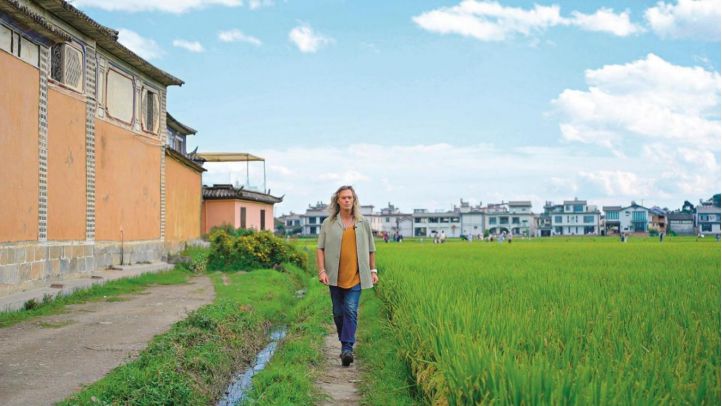
Brian walking through the rice fields of Xizhou.
"Hello, Village Chief Linden!"
Brian opened two hotels in Xizhou called the Linden Centre, which has gained significant popularity throughout Dali.
At 8 a.m. on the day of the interview, the Global People reporter team arrived at the Linden Centre. As soon as we stepped through the door, Brian greeted us warmly: "Hello, welcome!" Brian, a tall man, bent over slightly as he shook hands with us. To welcome his "guests from the North", he had even prepared a pot of Erguotou (a strong Chinese liquor), saying, " I'm going to have a thorough chat with you all."
As we entered the Linden Centre and walked through the long corridor, Brian began to show us around, clearly familiar with every corner of the courtyard. Passing through the lobby, Brian greeted each guest with a warm "Good morning!" asking "Did you sleep well?" saying, "The coffee smells great today." In the dining room, we happened to meet a staff member in uniform. Brian eagerly introduced her to us, saying, "this is Aunt Zhang, our long-time employee of the Linden Centre." Aunt Zhang immediately set down the dishes in her hands, smiled, patted Brian’s arm, and said to the camera, "Welcome, welcome."
Brian took the reporters on a tour of the Linden Centre’s "Small Library," a space of about 10 square meters that he is particularly proud of. Upon entering, the center of the room features a large wooden table, on which are placed the wooden printing blocks used for making Dali's Jia Ma prints, an intangible cultural heritage of the region. Behind the table, a bookshelf spans an entire wall, filled with books in various languages, all telling stories of China. When the Linden Centre was first opened, Brian specifically made space for this room, opening it for free to both the villagers of Xizhou and tourists. "We often hold various cultural exchange events here and invite villagers and tourists to come and join us," he explained.

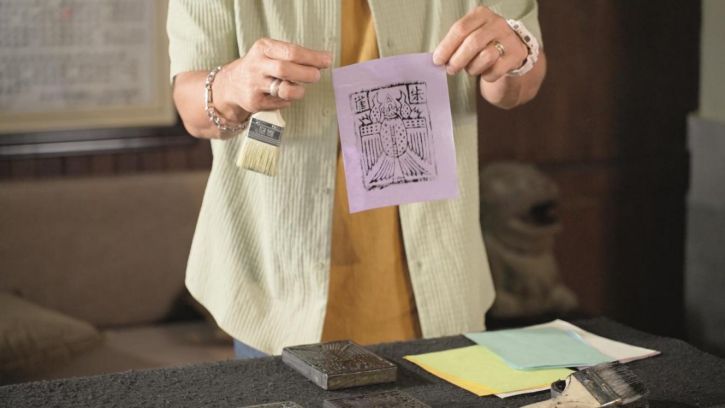
Brian and his assistant was crafting Dali’s intangible cultural heritage—Jia Ma prints.
Overall, a stroll around the Linden Centre reveals beautiful scenery at every turn, and Brian proudly continued his introductions without pause.
Brian is also a familiar figure on Sifang Street, the busiest commercial street in Xizhou, where the bustling crowds and merchants' calls fill the air. Every afternoon around 4 or 5 p.m., Brian walks through this street, heading toward the Linden Centre branch at the far end of the street.
Having frequented the area so often, Brian has become a good friend to the local merchants. Passing by a milk tea shop, he stopped and waved into the store, saying, " Hey! How's business today?" A few steps further, he greeted an elderly Bai woman at a fruit stand with a friendly "niqiu niqiu" (meaning "hello" in Bai). The people of Xizhou greeted him warmly along the way, calling out, "Hello, village chief Linden!"
Twenty years ago, when Brian first settled in Xizhou, the Linden Centre was still an old, abandoned house, and Sifang Street was far from the bustling place it is today. At that time, Brian never imagined he would put down roots in Xizhou, let alone become the "village chief" of the local Bai community.
In 2004, Brian boarded the midnight train in Kunming and arrived in Dali in the early morning, amid a light drizzle. The next day, he walked into a noodle restaurant in Xizhou and made his first Chinese friend there. Brian sat down and ordered a bowl of spicy and sour noodles, eating with gusto. The diners at the next table greeted him, first chatting across the table, and then simply joining him at his table to continue the conversation. Seeing this, the female owner brought over a pot of homemade fruit wine to add to the festivities. And just like that, two people from vastly different cultural backgrounds shared drinks and laughter on their first meeting. The diner's name was Yang Long, a local painter from Xizhou, who later became one of Brian’s closest friends.
"I've been to many countries and visited many places, but Xizhou gives me a unique sense of warmth," Brian said. "When I walk down the street, everyone greets me with a smile, and every shop welcomes me. The people of Xizhou don't see me as a 'foreigner,' but as a friend of another minority group— 'American nationality'." This sense of "inclusiveness" is something Brian cannot resist.
Xizhou's vitality goes beyond this. In the traditional Bai courtyards, Brian found the cultural core that has been preserved for centuries.
Not long after arriving in Xizhou, Yang Long took Brian to visit a Bai ancient house. Brian recalled the shock he felt the first time he stepped inside: "the wood and stone carvings in the corridor at the main entrance gave me goosebumps." That night, he couldn't sleep, already thinking about restoring the house. With Yang Long's help, Brian met staff members from the Xizhou town government. After some discussion, both sides reached an agreement, and the restoration officially began.
Brian followed the principle of "restoring the old as it was" in his approach to the house's renovation. He installed plumbing, built a water tank, and brought in experts to restore the intricate wood and stone carvings. Using fermented pig's blood as base putty, he refinished the wooden furniture. However, the original wooden structure of the house remained unchanged, and even the small, dim windows were preserved. Brian believes, "this is the truest beauty of China."
Two years later, the restoration of the house was completed which became the Linden Centre.
"China Feels More Like Home Than America"
Brian’s story with Xizhou began 20 years ago, but his introduction to China happened even earlier.
Born in 1962 in Chicago, USA, Brian grew up in a poor family with parents who were not well-educated. Before coming to China, he worked as a carpet cleaner, taking on odd jobs while attending night classes at the University of Illinois. At that time, he knew nothing about China.
In 1984, by chance, Brian saw a notice about a scholarship offered by the Chinese government posted on his night school bulletin board. He wrote an application letter, successfully received the scholarship, and came to study at Beijing Language and Culture University. Later, he went on to pursue further studies at Nanjing University. In this way, a "foreigner" who couldn't speak a word of Chinese, arrived in China.
At the age of 22, Brian appeared on the streets of Beijing for the first time, wearing a Chicago Cubs baseball team T-shirt, shorts, and leather sandals, topped with a Chinese military cap. He was surrounded by Beijing taxi drivers, all wearing white tank tops. This was during the early years of China's reform and opening-up, and the crowd expressed an innocent curiosity toward Brian.
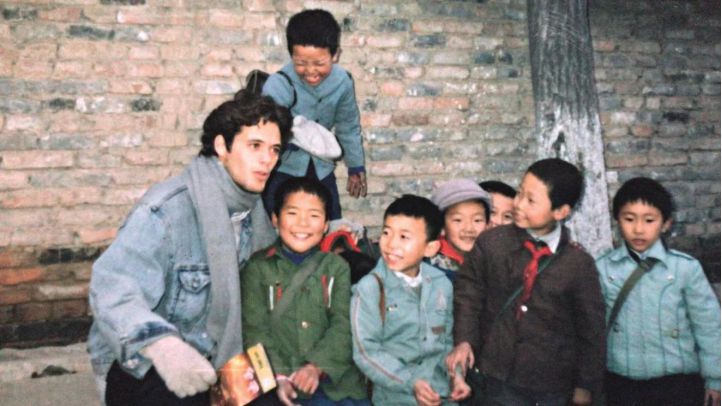
In the 1980s, Brian (far left) visiting China for the first time, with Chinese children.
Cultural differences did not hinder the enthusiasm that Beijing locals showed towards Brian. Brian recalled a time when he lost a contact lens in the pool at a swimming facility. At that time, contact lenses were hard to find in Beijing, and Brian jokingly said he became a "one-eyed man." Just when he had almost given up hope of finding it, he was notified to come to the swimming pool to "claim" it. "When I arrived, I saw three people gathered around a tiny transparent circle, staring at it as if they were tourists marveling at the Grand Canyon."
After arriving in China, Brian began to study Chinese intensively. "At first, I didn't make much progress, and I could only gesture and speak at the same time." However, even though his Chinese was far from perfect, it did not stop him from exploring the vast land of China. During his years in China, Brian visited large cities like Beijing, Shanghai, and Xi'an, and also traveled to rural areas in the western part of the country — "where you can find the oldest China." During these years, Brian completed his studies in China, participated in the filming of a Chinese movie, and joined the news team of Columbia Broadcasting System, covering dozens of stories about China. By 1988, when Brian went to Stanford University in the United States for his Ph.D., he had already traveled extensively across China, understood its culture and customs, and was fluent in Chinese.
In China, Brian found love. In 1987, while studying at Nanjing University, he met Jeanee, who is a Chinese-American born in San Francisco and an exchange student at the time. In 1993, they got married in the United States, and later had two sons — Shane and Bryce. In 2003, Brian brought his wife and children back to China. In 2004, he and Jeanee made a bold decision: they sold all their properties in the U.S. and moved with their two sons to settle in Xizhou.
Brian says, "Jeanee is just like me; she loves Xizhou so much. My two sons grew up in China. When we first arrived, Shane was 8 years old, and Bryce was 5. Shane is now engaged to a Dutch-American woman. They spend half of their time in China and the other half in the U.S. Bryce is studying environmental engineering, loves martial arts, speaks better Chinese than I do, and is currently involved in the renovation project at the Linden Centre. They both feel that China feels more like home than America."
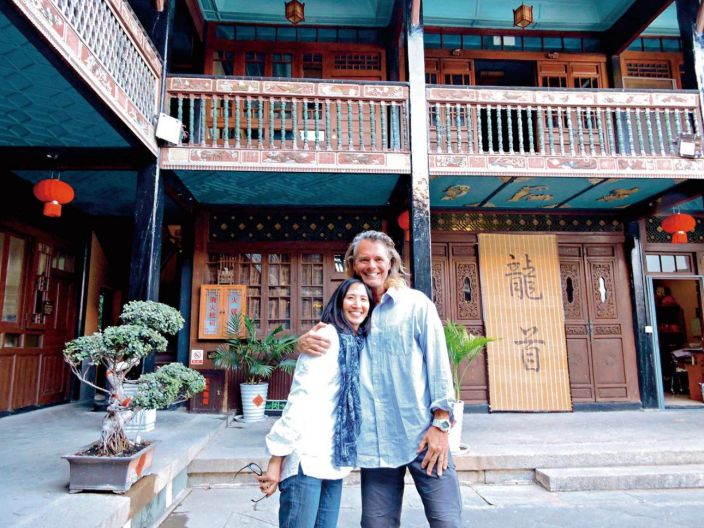
Brian and his wife Jeanee.
The Villagers Have Hope
The biggest impression China has left on Brian is: "the changes have been incredible!"
Brian recalls that when he first came to China, "China was still one of the poorest countries in the world." "Traveling from one city to another took over 10 hours on a green train; from one village to another, it was over 10 hours by bus. There weren't many hotels that could accommodate foreign visitors back then. It was the early 1980s, and China's domestic tourism market was not yet developed, so there were few tourists, let alone foreigners."
"After the reform and opening-up, China's economy developed rapidly, and so did its tourism industry," Brian told Global People. "The journey from Kunming to Dali, which used to take 10 hours, now only takes two hours by high-speed train. In Xizhou, there are various hotels and guesthouses for both domestic and international tourists. Even in rural China, people no longer look at foreigners with curious eyes. By the early 21st century, that 'spotlight effect' had already disappeared. Now, foreigners are a common sight in China. "
"After 2000, the Chinese government continued to increase investment in rural areas, and Xizhou's healthcare and education have greatly improved," Brian said. "for example, I used to go to Shanghai for dental care, but now I can see a dentist at a hospital in Dali, with equally advanced equipment."
He also believes that the changes brought by development are not just material but also mental. " I see that the elderly in Xizhou live very happily. They shop online and pick up their parcels at the delivery station. Sometimes, the old folks even 'complain' a bit about how tourism has developed so well that it gets crowded with too many tourists, which seems like a 'sweet burden.' I've also noticed that a few years ago, many young people from Dali went to work in other provinces, but now, more and more young people are coming back. They bring with their new ideas, hoping to help their hometown develop and become even more beautiful. "
"If I had to describe the spirit of the villagers with one word, it would be hope. This hope is very important. My friends in Xizhou have hope, the villagers in the neighboring Shilong Village have hope, and I, as a foreigner who has lived in China for a long time, also have hope. But I must say, I haven't seen this much hope or felt this kind of optimism in rural America," said Brian.
When Brian first opened the Linden Centre, he had an idea: to turn this Bai ethnic courtyard into a platform for "telling the real story of China." "Many Westerners have never been to China and don't speak Chinese. Their disconnected 'highfalutin talk' has deepened misunderstandings of China among foreigners. These descriptions are completely different from the China that my wife and I know. We love China, and we want to help American neighbors better understand this country."
Therefore, over the years, the guest list at the Linden Centre has included officials, such as former U.S. Secretary of State, and reporters from Western media outlets like The New York Times. " Yesterday, I led a Dutch tour group into the village of Xizhou. One person excitedly told me, 'I never imagined that China's countryside could be so prosperous and that the Chinese people could be so warm-hearted! ' "
Brian said, "China has never lacked the courage for reform. This determination has brought unprecedented development to the country and its people, and it has inspired my family and me to work hard and move forward to achieve our own dreams."
(Intern Hou Fangying contributed to this story.)
Source: Global People Online
Photos
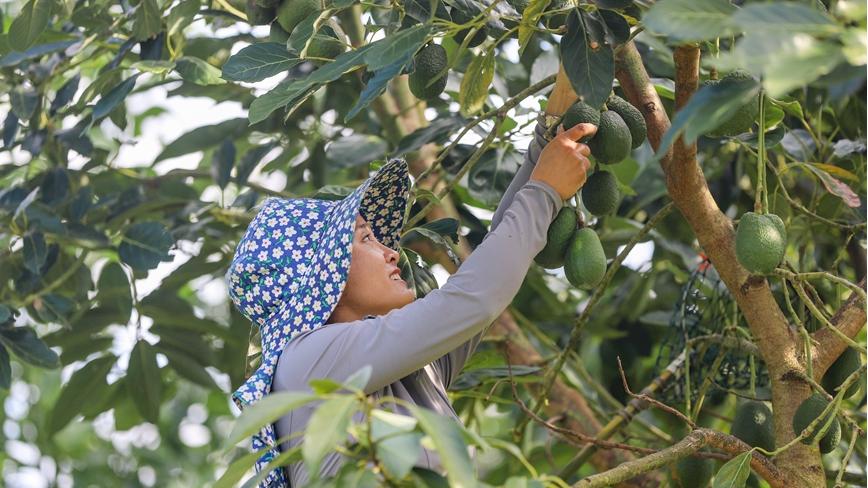 Menglian in SW China's Yunnan produces over 80 percent of country's avocados
Menglian in SW China's Yunnan produces over 80 percent of country's avocados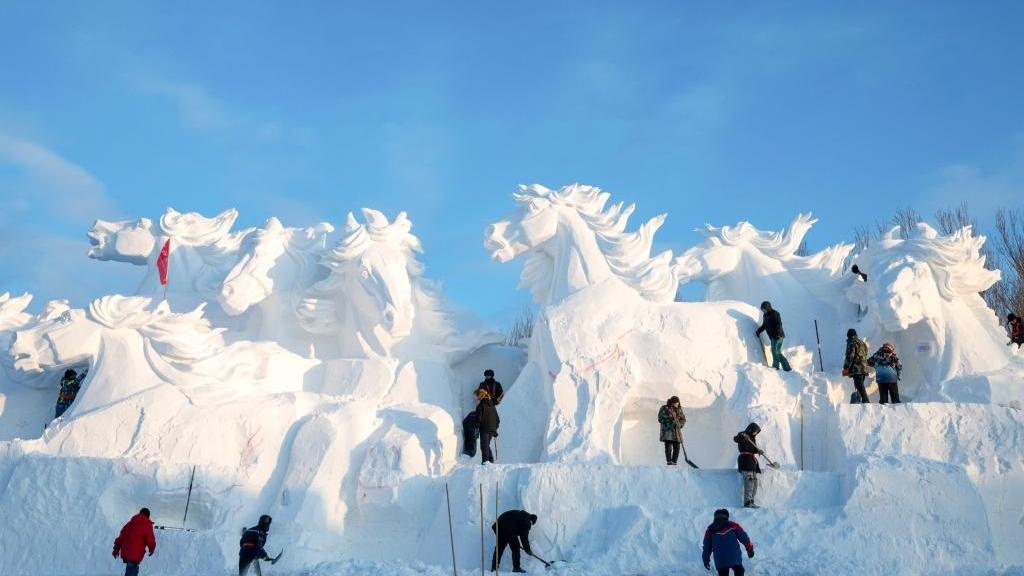 37th Sun Island Int'l Snow Sculpture Expo begins trial operation in China's Harbin
37th Sun Island Int'l Snow Sculpture Expo begins trial operation in China's Harbin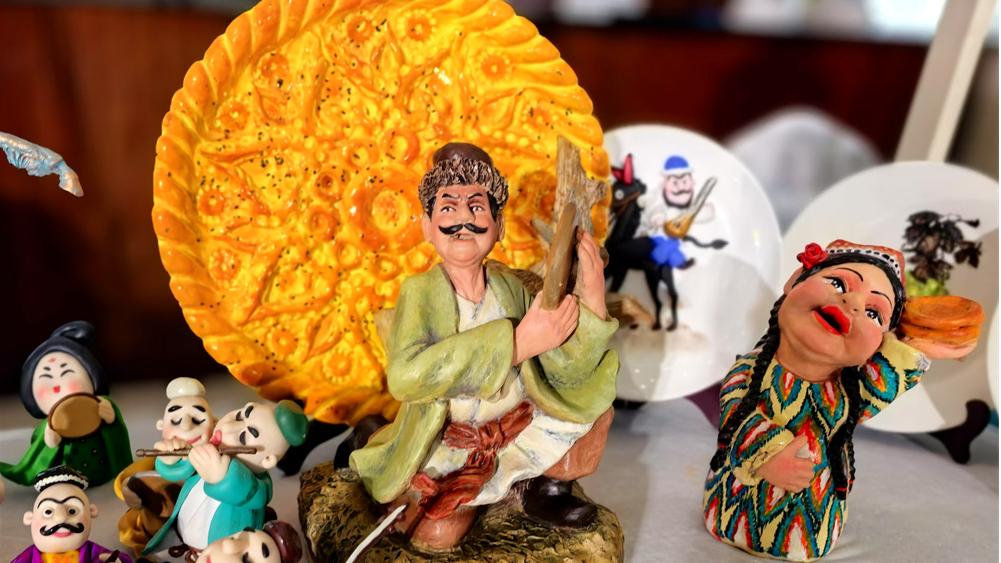 Explore an immersive cultural and creative products market at the Xinjiang Library
Explore an immersive cultural and creative products market at the Xinjiang Library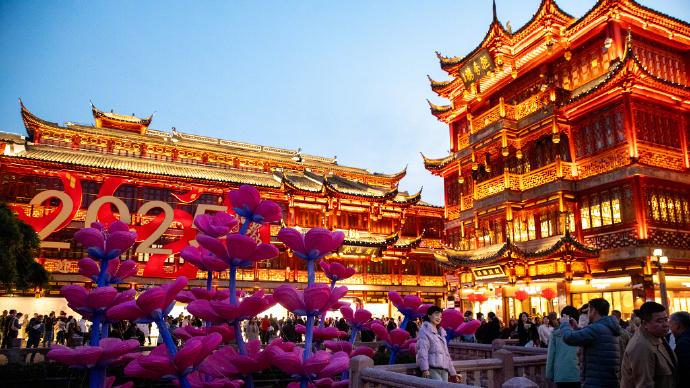 Yuyuan Garden Lantern Fair to light up Shanghai on New Year's Day
Yuyuan Garden Lantern Fair to light up Shanghai on New Year's Day
Related Stories
- Thousands of cherry blossoms bloom as winter brings spring-like scenery to SW China's Yunnan Province
- View of Jinghong City in SW China's Yunnan
- 3rd Yunnan Int'l Communication Forum opens in Xishuangbanna
- Scenery of Yulong Snow Mountain in Lijiang City, China's Yunnan
- In pics: Starlight Night Market in Jinghong, Yunnan
- Ginkgo tree foliage decorates the old town of Dali, SW China's Yunnan in early winter
- Picturesque scenery of Jianhu Lake amazes tourists in SW China's Yunnan
Copyright © 2024 People's Daily Online. All Rights Reserved.





